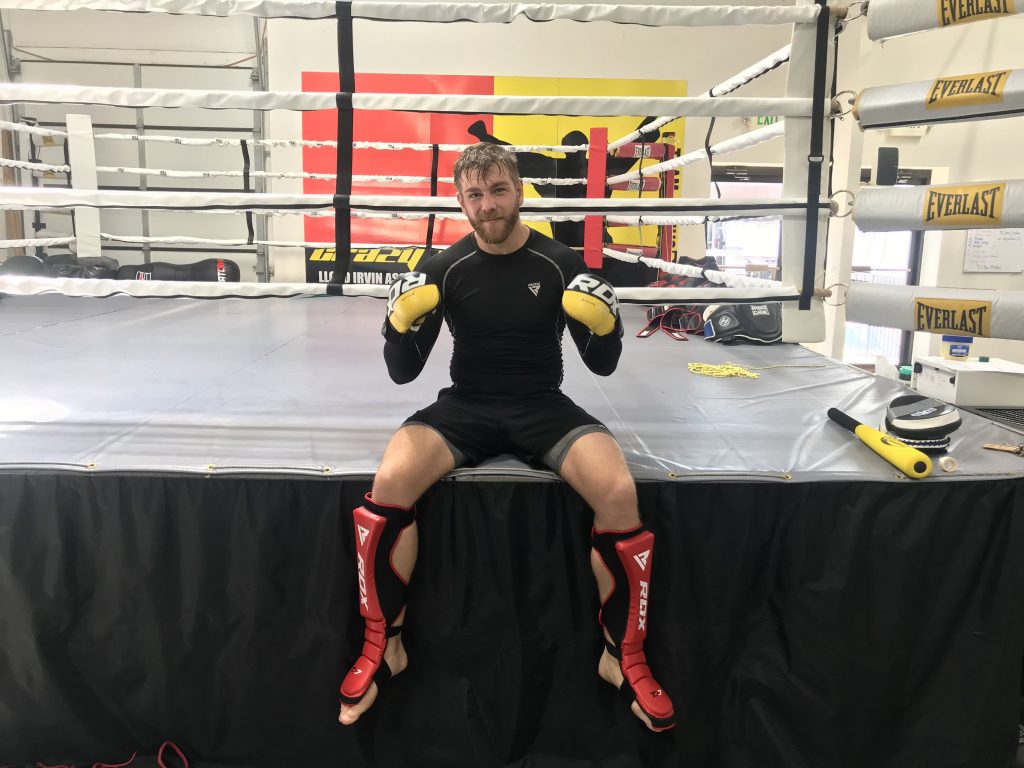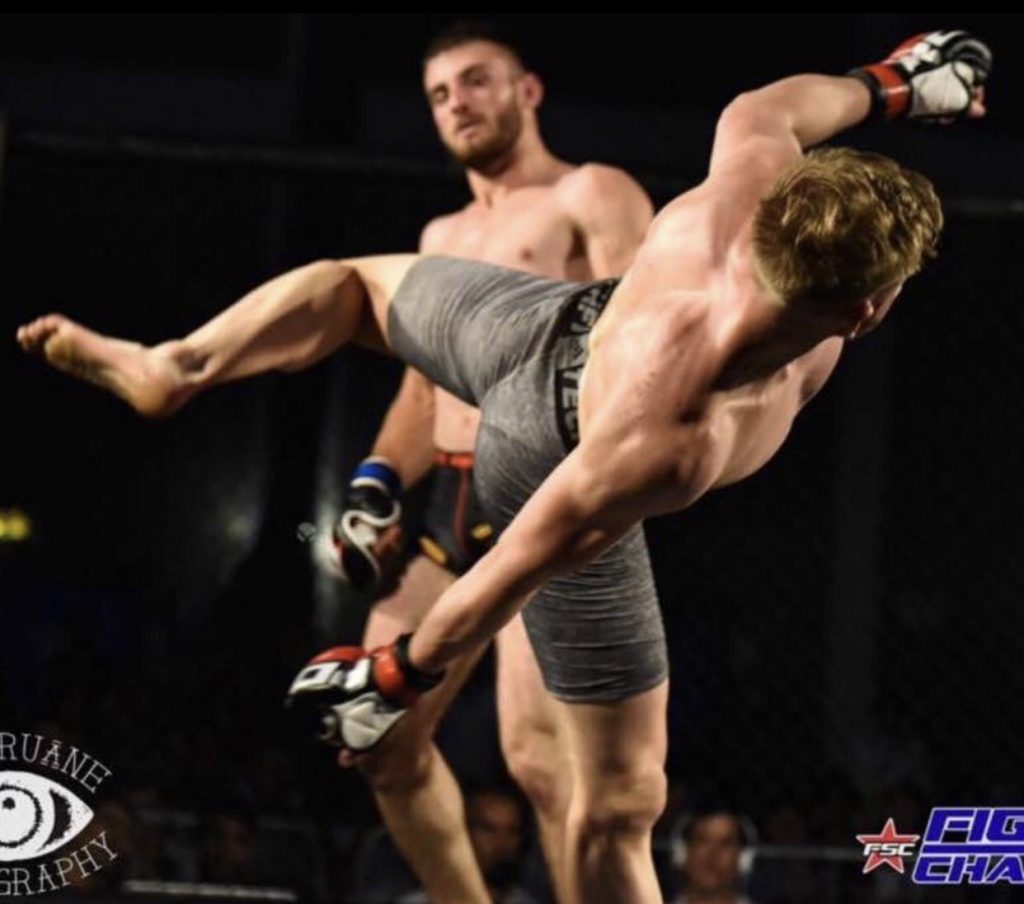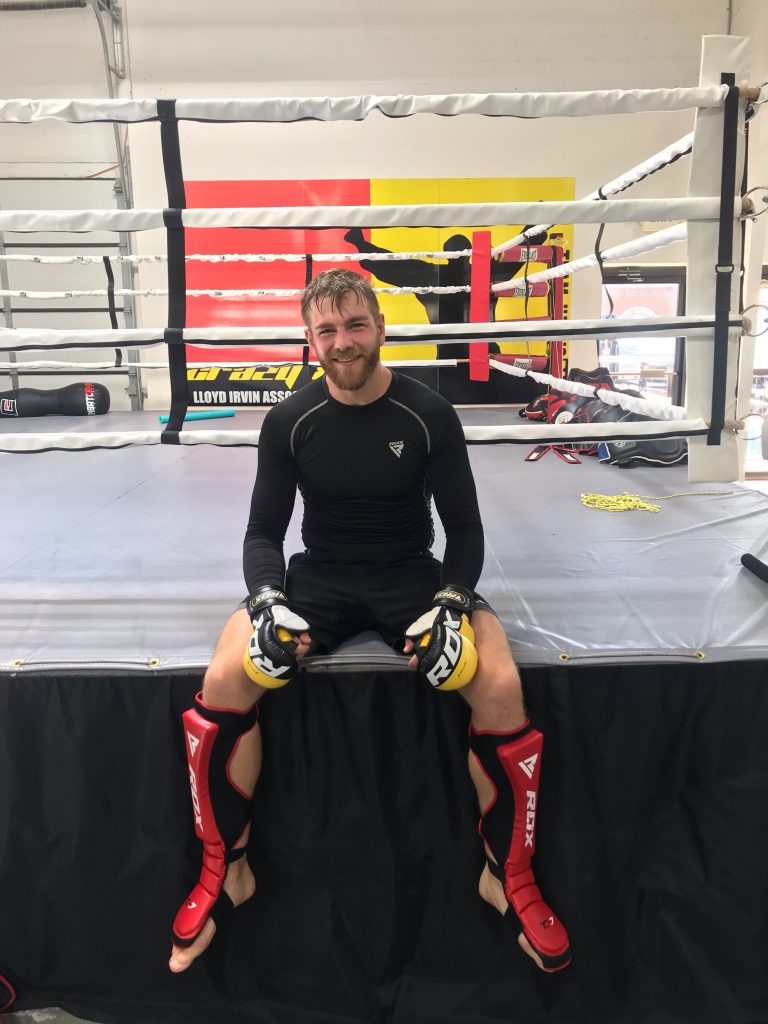Boxing and MMA have been around for a long time. These sports have seen athletes who have changed the game immensely from what it was before. The Combat Sports industry has picked up pace recently and promises great potential. United Kingdom is where the story of RDX Sports started and we made our resolve to provide athletes at home with premium quality equipment. It is important to appreciate the talent at home, and for the ring, cage or mat, we have Lewis Bruton from Birmingham, UK, doing a terrific job.
Lewis Bruton is an amateur MMA fighter quickly progressing towards a professional career. He holds a BSc (Hons) in Sports Therapy and is also a strength coach. You can check him out here.
Lewis is an epitome of what you could achieve with a determination to be the best, there are always ways to overcome obstacles.
Question: What was the first thing you thought about combat sports?
Lewis Bruton: When I was younger I remember watching boxing with my granddad and my uncles. They would tell me about how great Muhammad Ali was and Mike Tyson was. I remember watching Joe Calzaghe fight and staying up late just to witness his bout. The more I watched it, the more I understood the sports. I remember being 15 and watching Nick Diaz fight-straight away I was hooked. I realized how cool it was and questioning if I could do it? At first, I thought it was beyond me but the more I got into it and understood the game, started training and walking into the cage-the more I love the sport.
Question: What has been your biggest struggle in the field of combat sports?
Lewis Bruton: The biggest struggle I have found being in combat sports is trying to find a balance between my responsibilities in life and training. A lot of people don’t realize how much competition it is even at the amateur level. There are so many aspects that you have to learn like striking, grappling (that you have to be proficient in), strength training and proper recovery. On top of that, because there is not much opportunity to make decent money from it, in fact at the amateur rank people aren’t making anything but little commission on the ticket sale so it is hard balancing out priorities. Sponsorships are difficult to come by at the amateur level as well.
My biggest struggle has been balancing training, work-life, attending university classes along with working on my dissertation. The work and the routine struggle comes with the territory, I’ve seen multiple people do it but this was my biggest struggle.
Question: Where do you see yourself in five years?
Lewis Bruton: In the next 5 years, I see myself competing at the pro-level. I have set the target for myself to have my first pro fight in the next 2 years. After 5 years I would love to see myself competing in Cage Warriors, Bellator, PFL, ONE FC or even the UFC. These are the organizations that I have my eyes set on.
Question: How many hours a day do you train?
Lewis Bruton: I’ve recently moved from the UK to America so my training has been inconsistent. Back in the UK, I was doing my skills training, sparring, striking and grappling on average of 3 hours a day.
Question: How many hours is sufficient to be at your level?
Lewis Bruton: To be currently at the level I am at, I feel like you need to be putting in 3 to 6 hour days into the sport. You need to be smart about that as well and cannot be killing yourself every single day for that length of time. If you do, then eventually your body is going to start working against you. More is not always better, you know? Better is better. I think you need a good mixture of splitting time between your strength training, your skill work and your recovery. Optimally, you need to get your body working with you and be in synchronization with your mind so that there is a strong synergy between your body and training.
Question: Did you decide on combat sports? Or did someone inspire you? Who inspired you?
Lewis Bruton: I joined the Marines after I left school and was in basic training. I learned some combat training and how to handle myself in hand to hand combat. During the training, I damaged my Achilles and my knee. I ended up getting medically discharged which was very upsetting. I was four weeks away from achieving a Green Beret and passing out from my commando training. This got me very disappointed and wanted my form back, it took me a year to run relatively pain-free, again, but I was motivated to do so. I liked the intensity of the training that the marines offered and wanted it in my life, coupled with my ambition to be a professional athlete-I was inspired enough to try MMA.
MMA is merit-based so as long as you are putting in the work there will be a reward. I realized that I could work my way up to pro-level based on merit and that got me going to where I am today. I’m very happy with my progress and aim to compete at the pro-level.

Question: What advice do you have for people who want to get involved in the sport?
Lewis Bruton: My advice for people who want to get into the sport is to “just do it”. Find a gym and get involved but be consistent and don’t expect it to be an overnight process. There are so many people who come into a gym and think they can fight which is a humbling experience for them. Nobody becomes professional on the first day of training, you get your ass whooped for 6 months before you land some punches during sparring sessions. You just have to be consistent and enjoy the process.
Question: Does performance anxiety get to you?
Lewis Bruton: In terms of performance anxiety, I’m pretty calm. I remember my first amateur K1 fight, I was pretty anxious because of the weight cuts and weigh in’s but I ended up winning. I learned a lot from how important it is to get things right. During my first MMA fight, my main focus was to enjoy it. Live my moment and enjoy the fight. If you can find enjoyment at the moment and focus on being the best then by embracing it the anxiety goes away. Where I’m at in life, I look forward to my next fight.
Question: Do you think MMA and boxing are violent sports?
Lewis Bruton: From the outside, it seems like a violent sport. I don’t agree with that. When you are training and realize the work people put in to get to their level, you develop so much respect. The minor details that go into creating that perfect Knock Out and being effective make MMA a thinking sport.
Joe Rogan said, it’s a game of chess but with dire physical consequences and I couldn’t agree to it more. To be effective you have to be composed and calculated and you can’t walk into that ring aggressive or hyped up. When you come across a guy who is composed and who thinks tactically, you cannot compete against that with aggression or violence. The skill lies in the tact. Anyone can fight, you take them in the ring or put them in a corner then they will do the best to survive. MMA is all about composure and calmness under pressure and assessing the consequences of your actions in real-time.

Question: Is getting punched in the face fun? How did you get over the fear of it?
Lewis Bruton: Getting punched in the face is not as bad as you think it will be. A well-placed body shot is more traumatic. For example, a well-placed liver shot is more deadly. Being punched in the face is part of the sport. When I get hit now I don’t think about the damage or the hurt but I am in a state of appreciation.
Question: Would you take a broken nose or broken teeth?
Lewis Bruton: I break my nose several times. I have broken it twice already and it looks alright to me. I love my smile and don’t fancy the dentist or the bills of getting my teeth fixed. Honestly, a broken nose is cheaper to fix than teeth.
Question: What’s your least favorite aspect of training and fighting?
Lewis Bruton: I love everything about the training and fighting but if there has to be a least favorite aspect then it’s the obsession that comes with being perfect. It takes over your life in a way, for example, I can be out with my mates for a couple of drinks and see myself asking whether or not I can have it or how it will impact my weight. Sometimes, I spend the rest of the night beating myself up about it. Maintaining discipline in your eating habits is a part of the training and is a rather difficult balance to maintain.
Question: How has combat sport changed your life and mentality?
Lewis Bruton: Combat sports has greatly benefited my self-esteem and confidence. Growing up I did not have a stable home life or a healthy relationship with my step-father as sometimes the interactions turned violent. It was very demoralizing growing up in that environment. I did not know how to handle myself and got defensive at times. Combat sports taught me how to defend myself and be proficient in the sport which gave me a confidence boost. I feel calmer in competing with myself and have the confidence to stand up for myself. It helps and you develop as a person.
Question: What is most important to you before a fight?
Lewis Bruton: Before a fight, I need to get my mindset right. I want to be able to enjoy every moment and embrace it. Not many people experience the moment but I want to be able to do that and not look back with regret. The fight camp, the walkouts and everything about the entire thing are what I want to make the most of.
Question: What is most important to you after a fight?
Lewis Bruton: After the fight is when the fun happens. I get to spend time with my close mates and family. Whether I win or lose, I know these people were there for me. They went through hassle to see me fight. It is heart-warming that they stood in lines, bought tickets and saw you perform in the cage.





